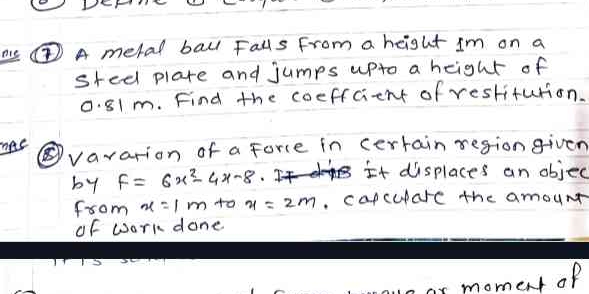A metal ball falls from a height of 1m on a steel plate and jumps up to a height of 0.81m. Find the coefficient of restitution. A variation of a force in a certain region is given... A metal ball falls from a height of 1m on a steel plate and jumps up to a height of 0.81m. Find the coefficient of restitution. A variation of a force in a certain region is given by F = 6x^2 - 4x - 8. It displaces an object from x = 1m to x = 2m. Calculate the amount of work done.

Understand the Problem
The question consists of two parts: the first part asks for the calculation of the coefficient of restitution after a metal ball bounces, and the second part requires calculating the work done by a force that varies over a specified distance.
Answer
The coefficient of restitution is $e = 0.9$ and the work done is $W = 0$.
Answer for screen readers
The coefficient of restitution is $e = 0.9$ and the work done by the force is $W = 0$.
Steps to Solve
- Calculate the Coefficient of Restitution
The coefficient of restitution (e) is defined as the ratio of the height after the bounce to the height before the bounce.
Using the formula:
$$ e = \sqrt{\frac{h'}{h}} $$
where $h'$ is the height after the bounce (0.81 m) and $h$ is the height before the bounce (1 m).
Thus,
$$ e = \sqrt{\frac{0.81}{1}} = \sqrt{0.81} = 0.9 $$
- Find the Work Done by the Varying Force
To calculate the work done (W) by a varying force over a distance, use the formula:
$$ W = \int_{a}^{b} F(x) , dx $$
where $F(x) = 6x^2 - 4x - 8$, $a = 1$, and $b = 2$.
- Set Up the Integral
First, set up the integral:
$$ W = \int_{1}^{2} (6x^2 - 4x - 8) , dx $$
- Calculate the Integral
Now calculate the integral by finding the antiderivative:
$$ W = \left[ 2x^3 - 2x^2 - 8x \right]_{1}^{2} $$
- Evaluate the Integral from 1 to 2
Substituting the bounds into the antiderivative:
$$ W = \left( 2(2)^3 - 2(2)^2 - 8(2) \right) - \left( 2(1)^3 - 2(1)^2 - 8(1) \right) $$
Calculating each term:
For $x = 2$:
$$ = 2(8) - 2(4) - 16 = 16 - 8 - 16 = -8 $$
For $x = 1$:
$$ = 2(1) - 2(1) - 8 = 2 - 2 - 8 = -8 $$
Now, substituting back into the equation for work done:
$$ W = -8 - (-8) = -8 + 8 = 0 $$
The coefficient of restitution is $e = 0.9$ and the work done by the force is $W = 0$.
More Information
The coefficient of restitution quantifies how elastic a collision is, with values ranging from 0 (perfectly inelastic) to 1 (perfectly elastic). In this case, the value of 0.9 indicates a mostly elastic collision.
The work done being zero suggests that the total work done on the object by the force, over the specified displacement, resulted in no net energy change.
Tips
- Confusing the heights when calculating the coefficient of restitution; ensure the correct heights are used.
- Misapplying the formula for work when dealing with integrals; always ensure to properly set the limits and evaluate.
AI-generated content may contain errors. Please verify critical information